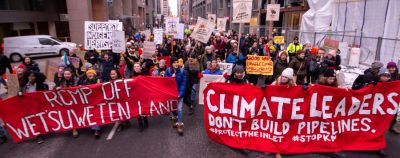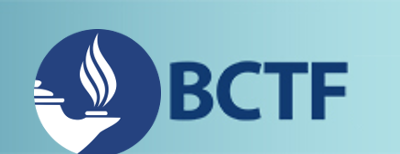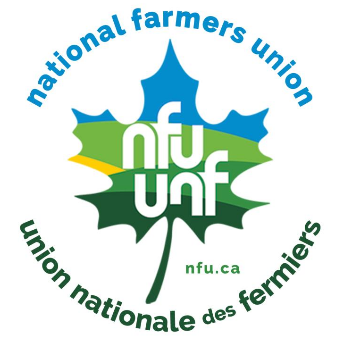Solidarity with the Wet’suwet’en Against the Colonial Policies of the Canadian State

The RCMP raids over the last days on the orders of the Canadian government on Wet’suwet’en protestors blocking the construction of a $6.6-billion pipeline, by Coastal GasLink for a liquefied natural gas project in Northern British Columbia, has set off a storm of blockades, protests, and occupations across the country. It is impossible not to immediately recall the troubled and often brutal history of Canadian colonialism. The clash between First Nations protestors and RCMP brings our attention back to the political scars of the more recent crises in Oka and Caledonia, among others. The huge militarized police presence that has been mobilized against the protestors all too readily illustrates how pot-holed and full of detours any path to reconciliation and restitution within the territorial boundaries of the Canadian state will be. The adoption by the BC NDP government of John Horgan in the fall of 2019 of the United Nations Declaration on the Rights of Indigenous Peoples, with its emphasis on consultations, negotiated settlements, and Indigenous territorial control, now looks like a completely hollow gesture in the face of the demands of the oil companies and the Canadian state to keep pumping fossil fuels at record levels in the face of a global climate crisis.
We publish here a selection of calls for solidarity with the Wet’suwet’en people, and other First Nations across Canada supporting their struggle, against the Canadian and BC states, the RCMP, and the oil and gas corporations. Enough with the violence, marginalization, and colonial abuse.
***
The Council of the Haida Nation Stands in Solidarity with Wet’suwet’en
As a sovereign nation, the Wet’suwet’en have the right to live in balance with their lands and waters and have a responsibility to defend their culture, language, and lifeways.

In 1985, we exercised our right and responsibility to protect Haida territory at Athlii Gwaay Lyell Island. At the time, our nation received support from allies and friends around the world. Their words, prayers, and acts of solidarity strengthened our stand and helped to protect this cherished place. Today, the Wet’suwet’en are exercising their jurisdiction in the same way.
The Wet’suwet’en are living on their lands and upholding ancestral laws to protect their territory for future generations. As a nation, we are allies in this commitment to defend our lands and waters. The proposed Coastal GasLink project could result in LNG tankers travelling through Haida territorial waters. Their stand is our stand, and together we have great strength.
The Government of Canada has joined the international community in adopting the United Nations Declaration of Rights of Indigenous People (UNDRIP). UNDRIP recognizes that Indigenous peoples have the right to free, prior and informed consent regarding any project that affects their lands, territories or resources.
The Haida Nation calls upon the Canadian Government to uphold its commitment to Indigenous peoples, reconciliation, and UNDRIP by meaningfully recognizing and respecting Wet’suwet’en authority to make decisions on projects that impact the wellbeing of their people and way of life.
Guudang ‘láa ad yahguudang dang.ad id kuuniisii,
With gratitude and respect to our ancestors,
Gaagwiis Jason Alsop, President of the Haida Nation
10 January 2019,
Haida Gwaii
Source: www.haidanation.ca
***
Solidarity Statement in support of Unist’ot’en Camp and the Wet’suwet’en Nation
by BC Teachers’ Federation
The BC Teachers’ Federation reaffirms our solidarity with the Wet’suwet’en Nation. As a union committed to the Truth and Reconciliation’s Calls to Action and the United Nations Declaration on the Rights of Indigenous Peoples, we call on the governments of BC and Canada, the Royal Canadian Mounted Police and Coastal GasLink Pipeline to respect the position taken by the Wet’suwet’en Hereditary Chiefs. They are insisting upon respect for Indigenous sovereignty as they have never ceded their jurisdiction to the lands they have governed and have been stewards of for millennia. All five clans of the Wet’suwet’en Nation have unanimously opposed all pipeline proposals. Forcibly removing peaceful land defenders from their traditional unceded lands is in violation of the UN Declaration.

Our provincial government recently passed a bill that states they will honor the UN Declaration on the Rights of Indigenous Peoples. Actions speaks louder than empty promises that First Peoples have faced for decades. If the leaders of our province and country are truly committed to reconciliation and honouring the UN Declaration on the Rights of Indigenous Peoples, then immediate action is required. Elected leaders must act now by negotiating with the respected leaders of the Wet’suwet’en Nation who hold the inherent right to self-determination including the right to defend their lands.
The 45,000 members of the BC Teachers’ Federation stand in solidarity with the Wet’suwet’en peoples and demand that the government of BC and Canada uphold their responsibilities laid out in the Supreme Court Delgamuukw-Gisday’wa decision of 1997. We stand as witnesses at this historic moment when our governments must make a choice to uphold this court decision or continue the ongoing legacy of colonization.
In solidarity, BC Teachers’ Federation
Source: www.bctf.ca
***
National Farmers Union in Solidarity with Wet’suwet’en Land Defenders
The National Farmers Union (NFU) stands in solidarity with Indigenous land protectors. We support initiatives by Indigenous People including the Unist’ot’en and Wet’suwet’en to resist resource extraction and energy projects that disrupt their Indigenous food and governance systems and interfere with the health of their lands, territories, and communities.
The NFU supports the implementation of the United Nations Declaration on the Rights of Indigenous Peopleand urges the Canadian government to implement the Truth & Reconciliation Commission’s 94 Calls to Action.
Coastal GasLink is attempting to force construction of a Liquid Natural Gas pipeline through unceded Wet’suwet’en territory. On February 6, 2020 the RCMP entered the territory and began arresting members of the Wet’suwet’en, forcibly removing land defenders, dismantling the barricades set up to protect their territory, and denying journalists access to witness and record the RCMP’s activities.

These actions, carried out with support of the BC and federal governments, are clearly in violation of Canada’s commitments to reconciliation, against the United Nations Declaration on the Rights of Indigenous People(UNDRIP) which Canada formally adopted in 2016, and in contravention of the Supreme Court of Canada’s 1997 Delgamuukw-Gisday’wa decision recognizing that the Wet’suwet’en people, as represented by their hereditary leaders, had not given up rights and title to their 22,000km2 territory. We agree with and support the Wet’suwet’en hereditary chiefs’ governance systems and their their inherent right to govern their territory through the Unist’ot’en camp and the Gidimt’en checkpoint.
Disturbed by the “forced removal, disproportionate use of force, harassment and intimidation” and “escalating threat of violence” against Indigenous peoples who oppose the pipeline, the UN Committee on the Elimination of Racial Discrimination in January, 2020 called for the immediate suspension of work on the Coastal GasLink pipeline until free, prior and informed consent is obtained from Indigenous peoples.
The Wet’suwet’en have not given free, prior and informed consent to the construction of a pipeline through their lands.
The decisions directing the RCMP to enter Wet’suwet’en territory and remove its defenders using force, and denying journalists access to witness their actions are condemned by Canadians from coast to coast to coast. In accordance with UNDRIP and our ongoing commitment to act in solidarity with Indigenous Peoples, we must inform ourselves and deepen our understanding of Indigenous sovereignty. We therefore denounce the repression of peaceful protesters, including Indigenous land protectors, and express our support for the rights of people to engage in acts of civil disobedience in defence of the preservation of water, air, land and wildlife for future generations.
We urge the governments of Canada and BC to uphold our commitment to the United Nations Declaration of the Rights of Indigenous Peoples (UNDRIP), and respect Wet’suwet’en Law by withdrawing the RCMP from Wet’suwet’en Nation and cancelling Coastal GasLink’s permits.
Source: www.nfu.ca
***
Statement on Arrests of Wet’suwet’en Land Defenders and Solidarity Protesters
by Greenpeace

In response to the dozens of arrests of Indigenous Land Defenders and solidarity protesters made by the RCMP and other law enforcement organizations today and last week, Greenpeace Canada Executive Director Christy Ferguson said:
“Over the past five days, we’ve seen people from all walks of life take to the streets, blockade ports, occupy government buildings and even interrupt rail service across the country in solidarity with the Wet’suwet’en people, who are being forced to put their lives on the line in an effort to protect their territory and their rights.
“People across Canada are right to be disturbed by what the B.C. Civil Liberties Association and Union of BC Indian Chiefs have calledexpanding and unreasonable powers of the RCMP, who are criminalizing Land Defenders, denying Indigenous Peoples access to their territory, and limiting media freedom to document the raids. The cross-Canada protests in solidarity with Wet’suwet’en have helped to keep national attention on the injustices happening on their territory. It’s the kind of vital role that peaceful protest has played throughout history in bearing witness and pressuring politicians to do what is right, not what is convenient.
“As B.C. Premier John Horgan prepares to open a new session of the Legislative Assembly with the Speech from the Throne, and as Prime Minister Trudeau campaigns abroad for a seat on the UN Security Council, we’d like to remind them of their duties to guarantee Indigenous rights, freedom of the press and the right to peaceful protest – core tenets of any healthy democracy.”
Notes
Article 10 of the UN Declaration on the Rights of Indigenous Peoples (UNDRIP), which has been ratified by the Canadian government and which the B.C. government has adopted into provincial law, states: “Indigenous peoples shall not be forcibly removed from their lands or territories. No relocation shall take place without the free, prior and informed consent of the Indigenous Peoples concerned and after agreement on just and fair compensation and, where possible, with the option of return.”
Greenpeace Canada, 10 February, 2020
Source: www.greenpeace.org
***
Solidarity Statement from Professors and Scholars in Support of the Wet’suwet’en People
We are writing to express deep gratitude to the Wet’suwet’en people who have been acting with formidable vision and strength to defend their people and territories from pipeline development, and have been facing violent incursions from RCMP and industry for doing so. They have been holding this line for years and caring for the lands and waters for countless generations. For us and for many others, the Unist´ot´en camp represents resurgence, reconnection, creativity, and relationship to the land. The long-term struggle of the Wet´suwet´en is a legitimate, legally sanctioned struggle for rights, autonomy and sovereignty on their unceded territories. These efforts benefit all Canadians. We send our deepest thanks.
We are also writing to denounce the actions of the federal government, the bc government and the RCMP. We ask that the illegal work on Unist’ot’en territory by Coastal GasLink be immediately stopped. We request that the federal and provincial governments respect Indigenous rights as outlined in our constitution, in countless court rulings, as well as the United Nations Declaration of the Rights of Indigenous people (UNDRIP) and ‘Anuc niwh’it’en (Wet’suwet’en law). We ask that Canadian leaders and politicians stop militarization, stop communicating false or biased information, and stop dividing communities. We reject the current campaign of disinformation, particularly statements that claim that all communities have signed on to the pipeline, which disregard the very important question of disputes over jurisdiction of territories between band councils and hereditary governance. In the Delgamuukw trial, the hereditary chiefs of the Wet´suwet´en were recognized as the rightful title holders, and their underlying sovereignty over the territory was established by Canada´s highest court. We urge both federal and provincial governments to understand the crucial distinction between consultation and consent, and to act accordingly.
We firmly oppose the Trans-Canada pipeline project and other extreme energy projects being developed that are threatening Indigenous lands. According to the latest scientific evidence there is still some possibility that catastrophic climate change can be slowed or arrested, but this goal requires an immediate phase-out of fossil fuel infrastructure (Millar et al., 2017, Smith et al., 2019). And we request the Governments heed the call of scientists who have made it clear that new fossil fuel infrastructure present the source of the world’s most threatening emissions, and would carry us toward dramatic increases in global temperature (Davis et al., 2010).
This applies to natural gas production and transport, because it also locks in fossil fuel use. The world needs to move straight to renewable energy sources, and as quickly as possible. Natural gas must not be seen as a transition fuel that will “bridge the gap” between high and low-carbon energy systems (Stephenson et al. 2012). Shale gas development and its related infrastructure will have very serious impacts not only on the territories of the Indigenous peoples that inhabit the province of British Columbia, but on areas of extraction in the northeast, along the territories and watersheds the pipeline will cross, and particularly on coastal communities, salmon habitat in rivers, and the remaining marine life in the Salish Sea and K̲andaliig̲wii (the Hecate Straight), that all will be impacted by increased tanker traffic.
Current governance processes have failed to adequately protect environment and treaty rights (Garvie & Shaw, 2016). To meet Canada’s climate targets and Canada’s commitments to reconciliation, the Canadian government needs to stop forcing gas pipelines violently through Indigenous lands.
We are also writing to encourage all Canadians to actively support the Wet’suwet’en People as they continue to demonstrate their commitment to protect their lands and waters. The most recent Intergovernmental Panel on Climate Change report has warned that we have only 12 years to meet the challenge of limiting increasing temperatures to 1.5 degrees (IPCC, 2018). Even at this historic juncture, we see no sign that our existing governments are capable of dealing with the current challenges all Canadians face. The twin crises of climate chaos and rising inequality are getting worse, not better. Research shows that substantial and swift transformation of our societies will be necessary in order to meet our climate and reconciliation goals (Scoones et al., 2015); however, our current economic and political systems are failing to heed these calls and move us toward a sustainable and just future. This is because these very economic and political systems facilitate the accumulation of wealth through the continued seizure of Indigenous land and the pillaging of the natural world. We cannot leave it to these failing systems to guide us.
What is needed is inspired visions and new systems that are able to guide us toward a much more just and sustainable future. The Wet’suwet’en people, and other communities defending their lands and waters across the world, are showing us better systems of decision making, along with better ways of living together and with the land. Our best hope for justice and sustainability in Canada lies with communities like the Wet’suwet’en nation, who take their relationship and responsibilities to their lands and waters so seriously that they will risk all they have to defend it. Our hope also lies with the many Canadians respecting and actively supporting the rights of these Indigenous communities to take care of their territories.
The Unist’ot’en camp houses a healing center, envisioned as a space to heal from the trauma suffered by so many First Nations in Canada due to colonial and extractivist violence. Projects such as the Trans-Canada pipeline perpetuate this violence. To invade this camp, to disrupt this space of healing, is particularly unconscionable. Canadians have pledged to work toward reconciliation to try to heal the injustices borne by Indigenous peoples; and this healing must also include the lands which we all inhabit. To begin to heal these relationships, the kind of violence seen recently in BC must end.
Support the Wet’suwet’en People: unistoten.camp/supportertoolkit.
*
Note to readers: please click the share buttons above or below. Forward this article to your email lists. Crosspost on your blog site, internet forums. etc.
Sources
- Davis, S. J., Caldeira, K., & Matthews, H. D. (2010). “Future CO2 emissions and climate change from existing energy infrastructure.” Science, 329(5997), PP. 1330-33.
- Garvie, K.H. and Shaw, K., (2016). “Shale gas development and community response: perspectives from Treaty 8 territory, British Columbia.” Local Environment, 21(8), pp.1009-28.
- Millar, R.J., Fuglestvedt, J.S., Friedlingstein, P., Rogelj, J., Grubb, M.J., Matthews, H.D., Skeie, R.B., Forster, P.M., Frame, D.J. and Allen, M.R. (2017) “Emission budgets and pathways consistent with limiting warming to 1.5 C.” Nature Geoscience, 10(10), p.741.
- Scoones, I., Leach, M.,and Newell, P., eds. (2015). The politics of green transformations. Routledge.
- Smith, C.J., Forster, P.M., Allen, M., Fuglestvedt, J., Millar, R.J., Rogelj, J. and Zickfeld, K. (2019). “Current fossil fuel infrastructure does not yet commit us to 1.5°C warming.” Nature Communications, 10(1), p.101.
- Stephenson, E., Doukas, A. and Shaw, K. (2012). “Greenwashing gas: Might a ‘transition fuel’ label legitimize carbon-intensive natural gas development?” Energy Policy, 46, pp. 452-59.
- IPCC (2018). Summary for Policymakers of IPCC Special Report on Global Warming of 1.5°C approved by governments, at www.ipcc.ch.

